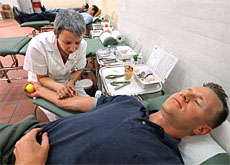World honours blood donors

On World Blood Donor Day, Swiss experts say they have sufficient supply to meet demand, but they warn that the situation is dramatic in other countries.
The World Health Organization (WHO) is fighting to improve the safety of blood supplies and increase the number of free and voluntary blood donations.
People in Switzerland gave blood 404,000 times last year, down nearly five per cent on 2003, pursuing a recent trend. But 2004 was also the first year that hospitals’ requirements fell for all types of blood products.
Medical centres used less red blood cell products, and demand for plasma dropped because of improved medical techniques, according to the Swiss Red Cross transfusion service.
“For the time being, there are enough donors,” said the head of the service, Rudolf Schwabe.
To counter the drop in donations, the transfusion service has reorganised the way it handles blood products. Rather than build up a supply of rare blood types, it has set up a network of donors it can call upon if needed.
No infections
The service, which has 250,000 regular donors, managed to maintain what it calls a high level of safety in 2004. Five cases of HIV infection were detected among donors, and another 19 cases of hepatitis C contamination were also discovered after a donation.
There were no reported cases of infections after blood transfusion, although the Red Cross cannot guarantee this will not happen every year. The last known case was in 2001.
The theme of this year’s World Blood Donor Day is “Celebrating your gift of blood” and is aimed at raising awareness of the need for blood and blood donors.
Over 80 million units of blood are donated every year around the world, but less than 40 per cent is collected in developing countries where more than four out of five people live.
So far, only 40 countries have set up a blood transfusion system that relies on voluntary donations, and less than 30 per cent of the WHO’s member states have a national transfusion service.
The special day will highlight the need for a safe blood supply from voluntary unpaid donors because they are associated with significantly lower levels of infections that can be transmitted by transfusion.
“Blood transfusion safety is a fundamental requirement for any health system,” said Lee Jong-wook, general director of the WHO.
Blood needed
Blood contaminated by the Aids virus is responsible for five per cent of all new HIV cases in Africa, and most developing countries do not screen blood for HIV or hepatitis B or C.
The WHO says that a reliable supply of safe blood is essential for improving healthcare at several levels, particularly for women and children.
More than half a million women die every year from complications related to pregnancy and childbirth worldwide – nearly all of them in developing countries.
Haemorrhage, accounting for a quarter of these complications, is the most common cause of maternal death.
And up to 70 per cent of all blood transfusions in Africa are given to children with severe anaemia due to malaria, which accounts for about one in five of all childhood deaths on the continent.
swissinfo with agencies
The Swiss Red Cross transfusion service is an independent company owned by the Red Cross and its 13 regional sections.
The service operates as a non-profit organisation and sells blood products at cost to hospitals.
More than 1,000 people work for the service, many of them part-time.
Volunteers also give their time for blood collection.
World blood Donor Day is being held for the second time.
June 14 was chosen because it is the birth date of Karl Landsteiner, who discovered the ABO blood group system.
In 2005, the World Health Organization is highlighting the fact that 82 per cent of the world’s population doesn’t have access to sufficient blood supplies.

In compliance with the JTI standards
More: SWI swissinfo.ch certified by the Journalism Trust Initiative









You can find an overview of ongoing debates with our journalists here . Please join us!
If you want to start a conversation about a topic raised in this article or want to report factual errors, email us at english@swissinfo.ch.